- Home
- Linda Newbery
Catcall Page 2
Catcall Read online
Page 2
Best of all were the lions. There was a family of them, out in the sunshine in a grass enclosure. We stood together, Jamie huddled against Dad’s legs, and watched the lions through a big pane of glass that was built into the fence. The lioness lay with her twin cubs on a mound, while the male prowled and prowled, walking in a slack, powerful way, his eyes swivelling. He’d worn a path beside a deep ditch that ran all the way round the enclosure, just inside the fence.
‘Patrolling his territory,’ Kim said. ‘Keeping an eye on things.’
‘Both eyes,’ said Jamie.
I realised how close the lion would come as he padded along the ditch below us. Excitement shivered through me. I stood perfectly still, but he didn’t look up. As he passed, I stared down at his rough, shaggy mane, and his tawny fur. What would it be like to push my hands into that thick mane, and feel his hot lion breath? I could smell him, strong and catty. I was close to a real lion, incredibly close, near enough to reach down and touch him if the glass pane hadn’t been there. Jamie pressed himself back against Dad’s legs. He must have stopped breathing, because I heard him let out a gust of air as the lion padded on past.
The female didn’t move from her mound. She was clasping a bloody chunk of bone, big enough to be from a cow or a pig. She held it down with one paw, licking it.
‘Did she kill it?’ said Jamie. ‘That bone?’
Kim huffed a laugh.
‘No, J,’ said Dad, tugging at the zip on Jamie’s fleece. ‘The park-keepers gave it to them. They don’t have to kill, not here.’
The cubs were playing around the lioness, rolling and tumbling and batting, like kittens. When one of them tried to tug at the bone, she gave it a cuff with her big front paw.
‘She won’t hurt it, will she?’ said Jamie.
‘Oh no,’ Dad told him. ‘She’s just saying, this is mine–keep off. She won’t hurt her own cubs.’
‘Not like Splodge with that mouse!’ I reminded Jamie. ‘Remember how fierce he was?’
About two weeks before, Splodge brought a mouse into the front room, where we were all watching TV. Mum let out a shriek and Mike sprang to his feet, but Splodge backed off, with a strange low growl in his throat. I was nearer. I got down on the floor and tried to work out how to save the mouse. If I pulled it away, Splodge would grip tighter with his teeth. Its eyes made me think of apple-pips, and its pink paws were like hands as it dangled from Splodge’s mouth. Splodge’s eyes glared with an angry wildness I’d never seen before–usually, he was a big softie. The mouse made a tiny sound, too tiny even to be a squeak, more like a gasp. Its front paws twitched feebly, and then, all in a second, I saw it die. The light went out of its eyes, and it hung quite still from Splodge’s jaws, a limp, dead thing.
I saw then how mysterious a life is. How, when it flickers out, nothing can bring it back.
‘What, did daft old Splodge-Puss manage to catch a mouse?’ Dad said now. ‘I’m surprised he could be bothered to heave himself off the sofa!’
‘He killed it!’ Jamie said proudly.
At the time, he’d been more excited than upset. I’d only thought how terrified the mouse must have been. And of that tiny, quick, heartbeating life, crushed to nothing.
‘Can you smell lion?’ I said. ‘I can. It’s strong and catty and furry. That’s why lions have to get downwind of whatever they’re stalking.’
Dad sniffed. ‘You must have a good sense of smell. I can only smell mud and grass.’
‘I can,’ said Jamie, still clinging to Dad’s coat. ‘I can smell lion.’
‘How about that?’ Kim said. ‘I wonder how many people can say they’ve been so close to a real live lion? I took Kevin to Whipsnade a couple of years ago, but we didn’t get as close as this.’
‘Would he attack us if the fence wasn’t there?’ Jamie asked.
Dad shook his head. ‘I don’t know. And I’m glad we won’t be finding out.’
The lion broke away from his circuit and loped to the top of the mound. He only glanced at the female and cubs, then stood with his head high, taking in smells and sounds from across the park. Dad passed me his binoculars, and as I focused, the lion turned his heavy head and looked straight at me with his amber eyes. A shock fizzled through me. I couldn’t look away from those stern, solemn lion eyes–I was held there, staring and staring back at him. For that second, there was nothing between me and him–no binoculars, no glass panel, no fence. I felt sure he knew me, knew what I was thinking.
Then he turned away.
‘Here, Dad.’ I handed back the binoculars, and he offered them to Kim. Jamie had slunk round behind Dad.
Kim laughed. ‘It’s all right, Jame. He can’t get you.’
‘The fence isn’t all that high.’ From behind Dad, Jamie tilted his head at it. ‘I bet a lion could jump that if he wanted.’
‘Not with the ditch underneath,’ Dad told him. ‘The park-keepers must know what they’re doing.’
The lion stared in another direction for a few moments, then gave a sigh and lay down near the lioness.
‘Now he’s like one of the lions in Trafalgar Square,’ Kim said.
We stood looking a bit longer. Kim took a couple of photos with the camera Dad had given her for Christmas. My fingers were going numb, and Jamie was stamping his feet to keep warm.
‘I don’t like seeing lions in cages,’ Dad said.
‘Hey!’ Kim jabbed his arm. ‘It was your idea to come!’
‘Yeah, I know,’ said Dad. ‘I don’t mind it so much with monkeys or deer. But lions–it doesn’t seem right.’
‘Oh, they look quite happy to me.’ Kim was looking at the leaflet with the map of the park. ‘It’s what they’re used to.’
I wasn’t sure. I’d wanted to come here, to see the lions and leopards in particular, but now I saw what Dad meant. It didn’t seem right for them to be penned up for people to stare at. Suddenly I felt ashamed of staring through binoculars. There was something about that lion that couldn’t be penned up in a cage. Something fierce and free.
‘I like them in cages,’ Jamie said. ‘It’s better than having them roam around wherever they want.’
Kim tugged at the brim of his woolly hat so that it went right down over his eyebrows. ‘Lions don’t live wild in this country, Jamie! They come from Africa.’
‘I know that!’ He pulled away, and pushed the hat out of his eyes. ‘I was just supposing.’
I just had to put Kim right. ‘These aren’t African lions,’ I told her. ‘They’re Asiatic. They’re from India, from the Gir Forest in Gujarat.’
She could have read that for herself on the notice-board, but I’d already worked out that she was the sort of person who said things without really knowing if they were true or not. Then I remembered something I’d read in the Wildlife of Africa book Dad gave me for Christmas. ‘D’you know how people first learned to be safe from lions?’
‘When they made guns?’ said Jamie.
‘No! Before that. Ages before guns.’
‘When they made zoos?’ Jamie tried.
‘No! Ages before that, as well.’
‘Go on then, Josh,’ said Dad. ‘Tell us.’ We started to walk away from the lions, towards some camels that stood in a bored, sniffy group outside their shed.
‘It was when they learned to make fire,’ I said. ‘Back in the Stone Age. Before, they could only hide in their caves and hope the lions wouldn’t find them. But once they learned to make fire, they were much safer.’
‘How?’ said Jamie.
I thought he meant how did early humans learn to make fire, and I was about to explain how they must have got the idea from seeing trees struck by lightning, but Kim told him, ‘The lions would have been frightened off by the flames.’
Jamie frowned. ‘I didn’t think a lion would be frightened.’
‘Survival instinct. They know how not to get hurt.’ Dad looked at his watch. ‘Come on–only another hour till closing. I’m freezing, I don’t know about you lot.
My survival instinct’s telling me to get inside a nice warm building.’
We headed for the insect house and the fruit bats. We finished up in the shop, where I chose some postcards for my Book of Cats. Jamie bought a puzzle, and Kim bought a lion key-ring for herself and a disposable camera for Kevin.
It was already dark by the time we set off home. Kim drove, Dad sat next to her with the map, Jamie with me in the back. Our headlamps lit up the string of lights, one by one, that showed us the middle of the country road.
‘Cats’ eyes,’ Jamie said suddenly. ‘They only come on at night, don’t they? Who switches them on?’
I gave him a little shove. ‘Durr! You really think someone goes round turning cats’ eyes on, along miles and miles of roads? Each one with its own little switch?’
‘They’re reflectors, Jamie,’ Dad said over his shoulder. ‘It’s the light from our headlamps, shining back. Clever idea–I wonder who thought of it?’
‘So why are they called cats’ eyes?’ Jamie asked.
‘Because cats can see in the dark,’ Kim explained.
‘No! Because cats’ eyes reflect in the dark,’ I corrected her. ‘You’ve seen that, Jamie, haven’t you? When we had our torches on bonfire night, and saw Splodge by the hedge.’
‘That’s right, Josh,’ Dad said. ‘Cats’ eyes are different from ours.’
I thought about lions and fire and darkness. I saw a bright bonfire, with flames snapping and leaping, sparks lifting into the dark. A circle of faces, golden with firelight. People sitting, huddled into their furs and skins, thinking they were safe. And they would be safe for as long as the fire burned, but behind them in the blackness there would be crouched shapes. There would be amber lion eyes watching, waiting.
4
THE BOOK OF CATS
I don’t know what it is with cats and me. I’ve been fascinated by them ever since I was little. Lions, leopards and tigers, cheetahs and ocelots. Ordinary cats as well. So I suppose it must have started with Mister, who was our cat till he had to be put to sleep. This was a long time ago, when Mum and Dad were together, but Mister’s still a sort of legend in our family. Mister the Magnificent, we called him. It was Dad who thought of the name Mister, because of the M-pattern Mister had on his forehead. He was a special cat, and he knew it. The way he paraded about, you could tell he thought he was king of the street. He had a few scars, from battles he’d fought with cats who thought they could take him on.
There’s something about cats and lions that pulls me to them. It’s not just how beautiful they are. It’s not just the gleam of their eyes or the way they stare. It’s not just their sleek fur or the pad of their feet or the ways they move. What it is–I don’t know what to call it except spirit of cat. Spirit of cat is in all of them, and it’s been there for hundreds–no, thousands–of years. What goes on in a lion’s head must be the same as it ever was. They might live in the twenty-first century and be kept in Wildlife Parks and have their pictures taken with digital cameras, but lion spirit never changes. It’s like a deep fire that’s been smouldering since ancient times and will go on smouldering as long as there are lions in the world. I hope that’s forever.
Another thing I like, you can keep lions in cages and zoos and even circuses, but you can’t tame them. Even house cats–Mum says they live with us on their own terms. ‘You can own a dog,’ she says, ‘but a cat owns you.’ Often it chooses you. That’s what happened with Mister, before Jamie and I were even born. He turned up in the garden one day, and soon he seemed to be there all the time, and next thing he’d moved in. Mum and Dad tried to find out whose cat he was, but no one ever claimed him and he decided to stay.
Even a fat, soft thing like Splodge, who spends half the day sleeping–he’s still made of spirit of cat, and he stares at you sometimes to let you know it. His eyes are green and deep, and it’s like he can see into my mind. He can see whatever’s in there.
He stares the stare of all cats. Proud and strong, knowing exactly what it is. Cat.
It was from Gran that I got the idea of the Book of Cats. That’s Gran Bryce, Dad’s mum.
When we go to Gran and Grandad’s, she shows us how she’s getting on with her Book of the Seasons, her special scrapbook. She starts a new one every year. She got the idea from this old book she’s got, The Country Diary of an Edwardian Lady, full of sketches and notes. When the Edwardian Lady noticed anything–the first primrose, when the first swallows arrived, stuff like that–she wrote it down in her book, and did a drawing. Gran liked the book so much, she decided to start her own. Now, every Christmas, Dad gives her a new notebook–a big one with hard covers, like a proper book–and she decorates the front with a collage of pictures cut from birthday cards and magazines, so each one’s different. In them she keeps cuttings and poems and notes. She writes in calligraphy pen (she learned to do that specially) and she does little pictures of flowers and fields and the birds that come to her bird-table. She’s not much good at drawing, to be honest, but she colours them in nicely and labels them and does borders of ivy or violets or snowflakes. Each book goes through a whole year, from the birds in the garden on January 1st to the berries left on the trees by the end of December.
She’s got eight of them now, on the top shelf of her bookcase. Dad calls them her Works of Art.
He says it’s from Gran and Grandad that I get my love of wildlife. They’ve got a garden with trees and a bird-table, not just a square of grass like ours. Grandad puts out bread and seed every day, and he taught me which birds are which. Since I was little, I’ve been able to tell a greenfinch from a chaffinch, and a jackdaw from a rook, and a coal-tit from a blue tit. So can Jamie, and Dad’s even better, because he can recognise birds from their calls. Sometimes we’re walking through trees and he’ll suddenly go, ‘Listen! Green woodpecker,’ and we’ll stop and look round and sometimes see a flash of green.
Anyway, last Christmas I decided to make a Book of Cats. Dad bought me a really good notebook, a set of felt pens, and glue. It’s a kind of project. Anything to do with cats, anything I like, goes into that book–bits of information from the internet, postcards, pictures from magazines. And lots of facts. I like facts, because you put them into your brain and they stay there even when you forget them, and sometimes come out all by themselves.
My Book of Cats is my special place. It’s mine and I know what’s in it. It’s like I can get right inside it and not come out till I want to.
The cover’s a collage, like Gran’s book. At first I started with anything I could find–lion and tiger photos, a Leo zodiac sign, a tiger mask, a Chinese lion made of bronze. But the thing with a collage is you can keep adding to it, and I’ve added and added to mine till the front cover is thick and padded. What it’s got now is eyes–cat eyes, lion eyes, tiger eyes, all these pairs of bright eyes, staring and staring. It’s amazing how many pairs of eyes you can find, once you start looking.
The Book of Cats stays on the desk in our bedroom, and I look at it or add something or do a new drawing nearly every day. It’s mine, and I never show it to anyone apart from family. Even Brody and Noori don’t know about it. The only time it leaves the house is when I stay with Dad, because he likes seeing what’s new, and he’s always got lots of books and magazines like National Geographic, so I might find something good.
My other rule is no cartoons. No Tom and Jerry, no Lion King, no Disney Jungle Book. I don’t like cats turned into cartoon jokes. I like them real.
5
RED KITES
‘What’re we doing tomorrow?’ Jamie asked, when we’d had tea. It was pizza, chips and ice-cream, from the freezer. Dad and Kim aren’t into cooking the way Mike is.
‘Well, it’s New Year’s Eve,’ Dad said. ‘And we always do something special on the last day of the year.’
With Dad, something special usually means going to a nature reserve or out for a long walk. The year before, it was bird-watching at Minsmere. It was ear-achingly cold in the East wind that cut
in from the sea, the sort of cold that goes right through your clothes and makes you think you’ll never warm up again. We sat in the hide with our sandwiches and flask, and I got so frozen that my legs were numbed in position and my hands could hardly hold the binoculars. But we saw little egrets and a marsh harrier and a whole flock of wintering brent geese, so it was worth it.
‘Yes. And?’ went Jamie.
‘I thought we’d go for a walk on the Ridgeway,’ Dad said. ‘Specially if it’s as bright as today. We’ll probably see red kites. There are lots of them, up on the Chilterns.’
‘Cool!’ said Jamie.
Dad looked at Kim. ‘And, um, I think Kevin’s coming. Is that right, Kim?’
‘Yes,’ said Kim, stacking the dishwasher. ‘Mum’s dropping him off around nine.’
Right, I thought, and I bet he’ll be staying here. In that bedroom.
‘It’s nice for you boys to have each other’s company,’ Kim told us.
Kevin turned up while we were having breakfast. His nan brought him, and stayed for coffee. We’d met Kevin three or four times before, and he was always the same. He was a good bit taller than me, and he wore a peaked cap and a baggy sweatshirt and baggy jeans and trainers. His dull, bored expression showed he’d rather be somewhere else, and he was one of those people who talk without moving their face, like they can’t spare the energy.
We said hello to Kevin, and he went Ur. His eyes flicked towards us then away, to show he hadn’t seen anything worth bothering with. He reminded me of Toby at school, who thinks he’s hard.
‘Boys, this is my mum,’ said Kim. ‘Kevin’s nan.’
‘Pleased to meet you, Josh and Jamie,’ said the nan, who was a smiley sort of person like Kim. Smileyness in their family must have run out when it reached Kevin.
Course, Dad had to go all breezy and embarrassing, coming out with things like, ‘Well! It’s a good day for it!’ and ‘Be a bit bracing up on those hills,’ and even, ‘Get Josh to tell you about the wildlife park, Kev.’

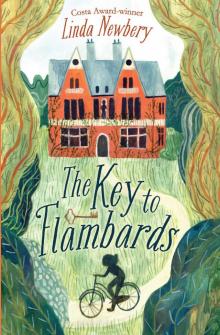 The Key to Flambards
The Key to Flambards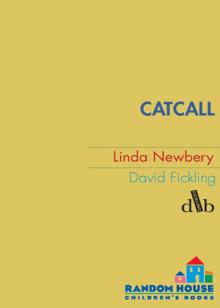 Catcall
Catcall Sisterland
Sisterland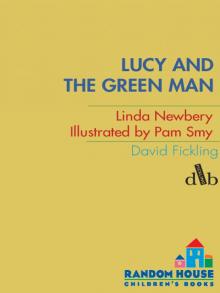 Lucy and the Green Man
Lucy and the Green Man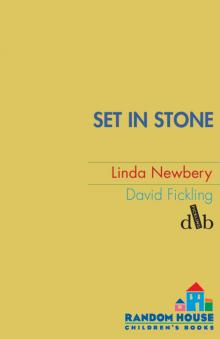 Set In Stone
Set In Stone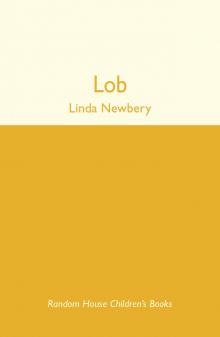 Lob
Lob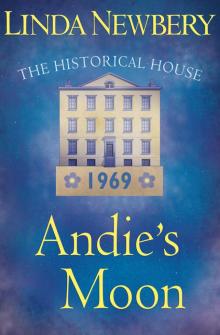 Andie's Moon
Andie's Moon The Shell House
The Shell House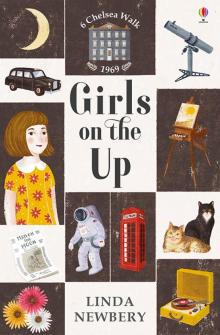 Girls on the Up
Girls on the Up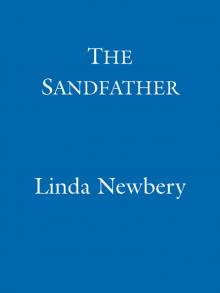 The Sandfather
The Sandfather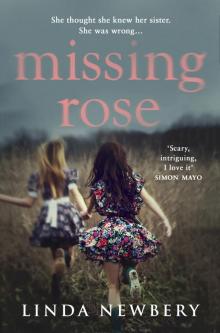 Missing Rose
Missing Rose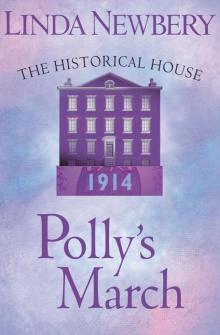 Polly's March
Polly's March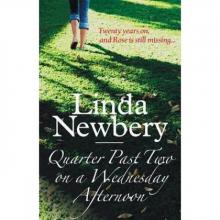 Quarter Past Two on a Wednesday Afternoon
Quarter Past Two on a Wednesday Afternoon Flightsend
Flightsend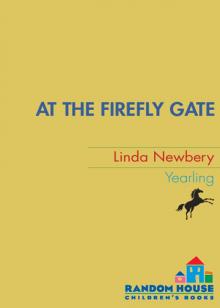 At the Firefly Gate
At the Firefly Gate